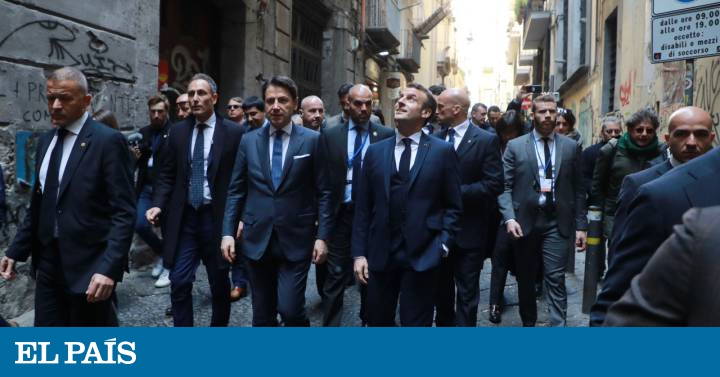The diplomatic gap that opened between France and Italy with the former Executive is a thing of the past. Italian Prime Minister Giuseppe Conte yesterday received in Naples the French president, Emmanuel Macron, to hold a bilateral summit, the first in two years. "We have managed to find a common path," applauded Macron. The meeting draws the final folder to tensions that lasted from mid-2018 until last September due to the lack of harmony with the leader of the League, Matteo Salvini.
The departure of the Italian government from the ultra leader paved the way to resume cooperation between the two countries. In September 2019, with a visit from Macron to Conte, leader of a new Government in alliance with the center-left and with a clear will to break the legacy of the previous coalition with the ultra-right-wing League, a return to normalcy began to take shape. now culminates with the signing of several interministerial bilateral agreements. In the pacts, with different themes, issues such as immigration, culture or economy are addressed.
The tune between the two leaders, who before the meeting walked together through the city of Naples and exchanged gifts, was also total in some issues so far controversial between Paris and Rome. Both leaders showed their commitment to implement a permanent and non-eventual mechanism in Europe, as is the case now, to manage migratory flows, “from the landing, to the distribution of migrants through the management of repatriations and including a collaboration with countries of origin and transit, ”said Conte.
Tensions with Macron marked Salvini's period as Interior Minister and strong man of the Italian government coalition between his party, La Liga, and the 5 Star Movement. From the outset, both Macron and Salvini - self-directed in respective leaders of liberal and Europeanist Europe, and the nationalist and Eurosceptic - sought polarization. The main reason for disagreement was immigration policy in the European Union.
Another of the key issues on the table of the two countries is the crisis in Libya, a country at war, in which both Rome and Paris have great political, economic and strategic interests and not always shared. "It is essential that we promote peace processes together and that we work to achieve a ceasefire and respect the arms embargo," said the Italian prime minister. And he stressed the need to implement the commitment of the Berlin conference last January, in which the leaders of Russia, Turkey, Germany, Italy and France among other countries agreed to curb the military and political interference of foreign powers in the polvorín of the country. "The cooperation between Italy and France will be essential to respect the arms embargo," said Macron.
Both representatives agreed to describe the restart of bilateral relations as "an element of balance for the European Union." “Italy and France want to work together to make the EU more supportive, safer, more social, more environmentally friendly and also stronger in the world,” said Conte.
"With France," the Italian Prime Minister added, "we share the goal of reaching a European banking union and work together to reduce the distances between different European countries on this issue." Although the French president always kept an open channel with his Italian counterpart, Sergio Mattarella, one of the architects of the reconciliation, there was a time that between France and Italy they were all fictions. Border control, the support of the previous Government of Rome to the yellow vests or the continuous insults of Matteo Salvini to the French president were the order of the day.
Accusations and mutual interference
That the background of the disagreement between France and Italy was ideological was clear in the multiple accusations and interference between the two countries. Macron described the Salvini camp as "nationalist leprosy" and this, allied with the leader of the French extreme right, Marine Le Pen, declared his sympathies with the movement of the yellow vests, one of whose objectives was the fall of Macron. The most critical moment happened in February 2019, after the visit of Luigi Di Maio, Italian vice prime minister, to representatives of the movement. The incident led Paris to call its ambassador in Rome for consultations, the first time since 1940. Although Italy now appears again as an ally of France, the fragility of its Government and the uncertainty about its duration make projects difficult to long term.

